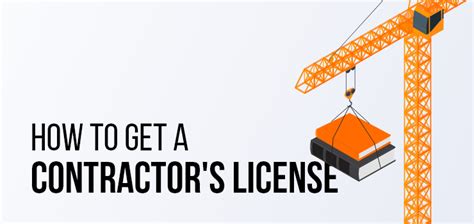How to Get a Contractor's License: A Step-by-Step Guide
So, you're ready to take the leap and become a licensed contractor? That's fantastic! Securing a contractor's license is a crucial step toward building a successful and legitimate business. This comprehensive guide breaks down the process, helping you navigate the complexities and achieve your entrepreneurial goals. Remember, specific requirements vary by state and sometimes even by county, so always verify the information with your local licensing board.
Understanding the Importance of a Contractor's License
Before diving into the application process, let's emphasize why a contractor's license is essential. It's more than just a piece of paper; it's a symbol of legitimacy and professionalism. A license demonstrates:
- Legality: Operating without a license is illegal in most jurisdictions and can result in hefty fines and legal repercussions.
- Credibility: A license builds trust with clients, assuring them of your competency and adherence to industry standards.
- Insurance & Bonding: Licensing often necessitates securing liability insurance and bonds, protecting both you and your clients from potential financial losses.
- Access to Jobs: Many projects require licensed contractors, limiting your opportunities without one.
Steps to Getting Your Contractor's License
The process can seem daunting, but breaking it down into manageable steps makes it less overwhelming.
1. Research Your State/Local Requirements
This is the most crucial first step. Visit your state's contractor licensing board website. Their website will provide specific requirements, application forms, and fees. Key areas to research include:
- Type of License: Determine the specific type of contractor's license you need (e.g., general contractor, electrical contractor, plumbing contractor). Your scope of work dictates this.
- Education & Experience: Most states mandate a certain level of education, apprenticeship, or work experience. This varies widely.
- Exams: Many states require passing a trade-specific exam to demonstrate your knowledge and skills.
- Background Checks: Expect background checks and potentially fingerprinting as part of the application process.
- Fees & Costs: Be prepared for application fees, exam fees, and potentially other associated costs.
2. Gather Necessary Documents
Once you understand the requirements, meticulously gather all necessary documents. This might include:
- Application Form: Download and complete the application form accurately and thoroughly.
- Proof of Identity: Driver's license, passport, etc.
- Proof of Education/Experience: Transcripts, certificates, letters of employment, etc.
- References: Obtain references from previous employers or clients who can vouch for your skills.
- Bonding & Insurance Information: Proof of liability insurance and surety bonds (if required).
3. Prepare for and Take the Exam (If Applicable)
Thorough preparation is key to passing the contractor's licensing exam. Utilize study guides, practice exams, and consider enrolling in a prep course.
4. Submit Your Application
Carefully review your completed application and all supporting documentation before submitting it to the licensing board. Ensure everything is accurate and complete.
5. Wait for Approval
Processing times vary considerably. Be patient and follow up with the licensing board if you haven't heard back within a reasonable timeframe.
6. Maintain Your License
Once licensed, remember that maintaining your license involves ongoing responsibilities, including continuing education requirements, regular renewals, and adherence to all regulations.
Tips for Success
- Start Early: The application process can take time, so begin well in advance of your target date.
- Organize: Keep meticulous records of all documents and communications.
- Seek Professional Help: If you're struggling with any aspect of the process, consider seeking guidance from a licensing consultant or attorney.
- Network: Connect with other contractors to learn from their experiences and gain valuable insights.
Getting a contractor's license is a significant investment of time and effort, but it's an investment that pays off handsomely. By following these steps and remaining diligent, you can pave the way for a successful and thriving contracting business. Remember to always check your state's specific requirements for the most up-to-date information.
